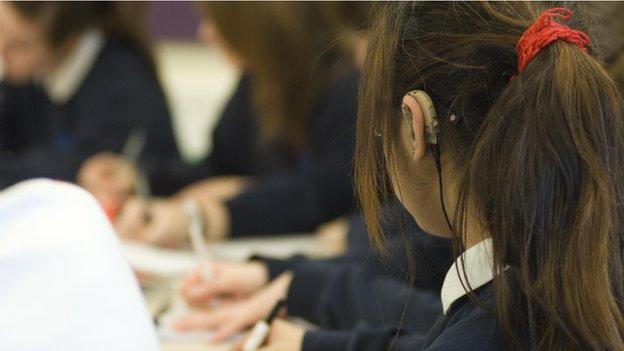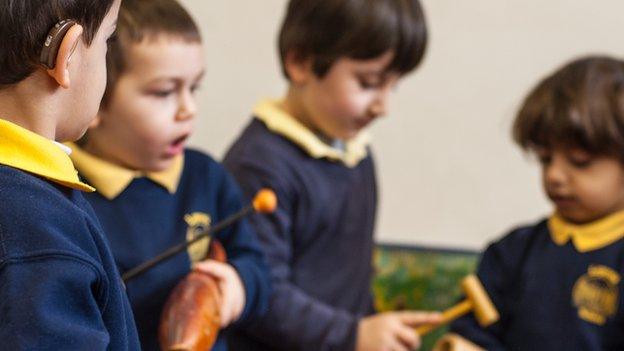Partially deaf children 'overlooked' at school
- Published

Poor acoustics in the classroom make hearing even more difficult for partially deaf children
The National Deaf Children's Society is calling on the next government to "provide the vital support" needed for partially deaf children in the UK.
Nearly half of children with limited hearing fall behind at school, a survey of parents and professionals found.
It suggested children who are hard of hearing struggle in classrooms with poor acoustics and a lack of understanding by staff.
Parents said their child's deafness "had a major impact" in the school day.
'Missing out'
The small, online questionnaire revealed children with limited hearing were "falling behind" in mainstream schools, compared with their peers.
The vast majority of the parents questioned (86%) had partially deaf children in mainstream schools.
They said their children struggled in classrooms with background noise or trying to understand speech from a distance.
One-third of parents blamed a lack of staff awareness of their child's mild or moderate deafness for their difficulties.
The study, external said that children could miss up to half of what the teacher said in class, which had an impact on their reading, writing, spelling and spoken language.
Susan Daniels, chief executive of the NDCS said: "Mild and moderate deafness can often be overlooked because of a perception that it is not a serious condition or that children are 'coping' at school.
"But often these children are nodding their way through life without really understanding what is being said and missing out on vital early development."
She said that more than half of children with limited hearing failed to achieve five good GCSEs.
The NDCS estimates there are 20,000 mild to moderately deaf children in the UK.
Support

The survey found even mild hearing loss has an impact on a child's development
Parents said their child's deafness had a major impact on their school day.
Nearly half reported it affected participation in assembly, in PE lessons and in group work.
The findings suggested that one-to-one teaching is "just as vital" for children with mild or moderate hearing as it is for those who are completely deaf.
One parent said a year ago their son "would not even look people in the face".
"But now with one-to-one at school and some superb teaching he is standing up in class and presenting in large groups and enjoying it."
The report from the NDCS coincides with Deafness Awareness Week which runs from 4-10 May.